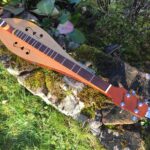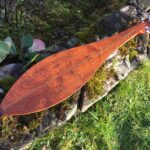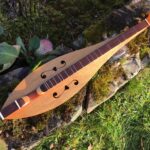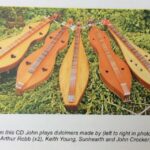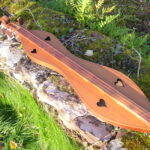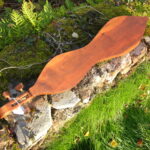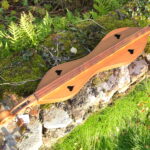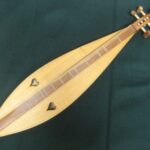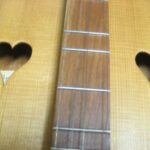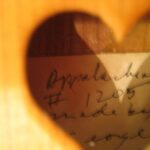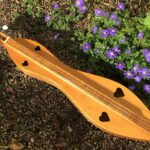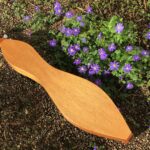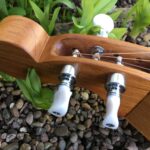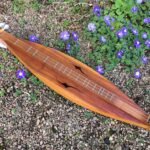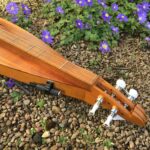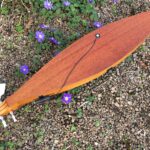John Shaw’s Dulcimers
John Shaw was a superb mountain dulcimer player, a tireless arranger, a polymath and a gentleman. He was a mentor to so many of us in the UK when we started playing, and his creative arrangements of such a wide range of fascinating music will constitute a major legacy for the international dulcimer community. John taught at many UK festivals and even a few years back toured venues on the US East Coast. His smooth, melodic and unfussy style of playing, such a positive influence on many new players, was another major legacy. He leaves behind many friends on both sides of the Atlantic.
John was not a collector of dulcimers – not in the sense of amassing trophy instruments and displaying them immaculately in their original state! For John, they had to earn their keep and put up with a busy life on the road. And he would readily adapt them to suit his playing style or the need for quick and accurate tuning. But of course he had an excellent eye for quality, particularly in sound….
John’s most personal dulcimers have rightly gone to his family, but the remainder are now being sold to the wider dulcimer community. Below I’ve listed those available now or shortly.
2.265 1998 John Crocker Teardrop, 4 String, 3 Course £ Sold
Hand-drawn and hand-coloured oblong label, with a gold tree and three monkeys/squirrels (?): “J.H. Crocker/ 30 Court Road/ Horfield/ Bristol [Tel. No.]/ March 1998/ Sapele, Rosewood & Butternut.” Commissioned by the late John Shaw of Bristol.
Elegant teardrop body with shallow fiddle edges, made of glowing, deep red, figured sapele (bookmatched with central purfling). Lighter butternut top with heart/F-hole soundholes. Deep, hollow (?) fingerboard comprising a sandwich of three woods: mahogany base, maple or beech mid-layer and dark rosewood overlay. Quite chunky frets with 6+, no 13+ and no markers. Flat mahogany head, fluted at the top, fitted with good quality Japanese (Gotoh?), small Schaller-type chrome tuners. Solid bone nut and compensated bridge. Original string slots have been supplemented to allow John Shaw’s favoured narrow three string layout. Machine screws as string anchors and a neat bone strainer on the top of the tail to eliminate string damage. Overall length 36¾”, lower bout 7¼”, depth 2”, FBW 1⅜”, VSL 26⅝” (medium scale), weight 2lb 03oz (1003g). Has a 6+ but not 13+ fret. Strings 12/[12], 14, 24w (as specified by John Shaw).
This is a really well-designed and well-executed dulcimer, using high quality materials. It has a sweet, quite light tone without huge volume. Good intonation. Has obviously been well used, with some evidence of wear on the frets, but will continue to serve an accomplished player well.
Click on images below to enlarge. The last image is from John Shaw’s ‘Regional Curiosity’ CD, showing his main playing dulcimers at the time. The Crocker is the last on the right.
3.108 (formerly 3.78) 1975 George Orthey #284 3 String Staple Fret Hourglass £340 inc. soft case
Handwritten inside on paper slip, “Appalachian Dulcimer/ #284/ Made by/ George Orthey/ Newport, Pa/ July 1975.” Ex-John Shaw.
Walnut single piece back and bookmatched sides, with spruce or cedar top. NB No maker’s stamp on back near tail, as on all later instruments. Matt finish. Elegant heart-soundholes with carved tail pointing towards the instrument tail. Narrow walnut open pegbox and sculpted scroll. Originally fitted with typical Orthey wooden friction tuners – square peg ‘buttons’ with fine, maple, tapered shafts. Now has professionally-fitted black Wittner viola pegs, which are internally geared and both look appropriate and work very smoothly. Walnut arched fingerboard (for maximum movement of the top), with brass staple frets under the melody string only; bevelled, slightly lowered strum hollow. Rosewood (?) nut and bridge with traditional wide cut string slots, with the strings slightly offset to the far side. Copper pin string anchors in curved tail. Overall length 34⅛”, upper bout 5⅜”, lower bout 7″, depth 1½”, FBW 1⅜”, VSL 27″ (medium scale), weight 1lb 8 oz (672g). Strings now 12, 12, 24w. No 6+ or 13+ fret.
A very early and well-preserved example of Orthey’s original staple-fret, hourglass dulcimer. Design very similar to my own #603. The shallow staple frets seem to give a more organic sound than the fully-fretted models. Sound is similarly full and loud, with quite a kick if you hit the melody string hard. Just a few almost invisible scuffs and dings on the edges and the whole body appears to have darkened, but generally excellent for its age.
Click on images below to enlarge. NB the original friction pegs in the pictures have now been replaced with black, geared Wittner pegs.
3.109 (formerly 3.27) 1984 George Orthey #1205 4 String Teardrop £Sold
Hand written, pasted-in label: “Appalachian Dulcimer/ #1205/ made by/ George F Orthey/ Newport p a/ Sept 84”. Ex-John Shaw.
Elegantly proportioned 4 string teardrop with solid cherry sides, cherry single-piece back, fingerboard and 2 piece carved scroll headstock. Back appears to be braced with a thin hardwood plate on the bass side towards the tail. Wide grained spruce top with 4 elongated “3D” heart soundholes as above. Black oval stamp under on back near tail: “Orthey Dulcimers/ [design of trees on hill]/Newport, PA.” Rosewood (?) nut and bridge, suitable for 4 string, 3 course or 4 equidistant string layouts. Originally fitted with typical Orthey friction tuning pegs, with thin beech (?) shafts and oblong cherry turning pegs/heads. Now fitted with black Wittner viola pegs, which are internally geared and have a very easy, smooth action. Four copper pins as string anchors; full width nickel frets; no 6+ fret. Plain decoration with inscribed line round top, 5mm from edge. Overall length 34”, upper bout N/A, lower bout 7″, depth 1½”, FBW 1⅜”, VSL 27″ (medium scale), weight 1lb 8oz (680g). Original (?) strings 12/12/13/14, now 12, 14, 24w. No 6+ fret.
Very clear and quite punchy sound, with its cherry body, but easily sweetened with good technique. Often used by John Shaw with Aeolian (DAC) tuning, in which it excels. Excellent condition.
Click on images below to enlarge. As above, the original friction pegs have been replaced with geared Wittners.
2.267 Early 1970s Capritaurus 4 String 3 Course, converted to 3 String Baritone £Sold
Oblong label: “This dulcimer/ was made by/ Capritaurus/ Felton, California”. ‘D4’ in dyno lettering nearby.
Golden mahogany laminated body with internal machine-kerfed sides. Little or no internal bracing. Solid spruce top with big heart soundholes, pointing towards the tail in traditional fashion. Typical FolkRoots closed pegbox with shallow scroll. Original guitar-type vertical tuners (x4) have been replaced with good quality geared banjo tuners (x3) and pearl buttons. The redundant screw/tuner holes have been plugged. Golden mahogany fingerboard, routed underneath and forming part of the sound chamber. Quite chunky, low frets (original?); 6+ no 13+ fret, possibly added at the same time as the baritone conversion. Professional quality replacement bone 3 slot nut and compensated bridge. Copper pin string anchors suitable for loop and ball-end strings. Overall length 36½”, upper bout 5⅜”, lower bout 7½”, body depth 2½”, FBW 1½”, VSL 29¼” (long scale), weight 2lb 04oz (1015g), strings now 14, 22w, 30w (baritone, tuned AEA).
In good condition, with just a few shallow pick marks across the nearside top. This is a neat, professional conversion of a standard dulcimer, commissioned by the great UK player John Shaw – it was his main baritone instrument. Its large body and longish scale length make it ideal for a baritone. The sustain goes on for ever! Tone and action excellent. Intonation with compensated bridge pretty good. Can also be tuned ADA to play along easily with standard DAD instruments, albeit with different chord shapes. Now has a good quality oblong hard case, lined internally – at extra cost – if required.
Click on images below to enlarge.
2.266 (ex-2.45) Ron Ewing Elliptical Dulcimer #22 4 String, 3 Course £350 + craftsman-made light wooden case £30 [or new padded case £25]
Handwritten inside on back: “Ron Ewing/ #22 /July 1977”. Very early instrument from this important and distinctive builder, now based in Ohio. Ron made this for one of Sandy Paton’s birthdays, when Ron was working for Folk Legacy Records. Sandy was the co-founder of the label. His wife, Caroline, also played the dulcimer. Their son, David, from whom I bought the dulcimer, is best known as an English Concertina player.
Even this early in his career, Ron was exploring the potential of mixing woods with different sound characteristics. This one has a western red cedar top, mahogany back and maple sides. The thin and lively top has fine ‘Trailing Diamond’ soundholes. There is faint evidence that these unbraced designs have needed strengthening in the past. Sassafras or white oak fingerboard with zero fret and 6+ fret (no 13+). Headstock and tailblock are a 5 piece laminate of mahogany and maple, the former with a low, stylised scroll. Originally Grover Sta-Tite friction tuners, now replaced with good quality banjo planetary pegs, complete with matching wooden spacers and pearl buttons. The nut has been cut for 4 equidistant or 3 course string layouts, floating triangular-section ebony bridge. Quite heavy bracing, but no lining. Fitted with a K&K contact pickup on the back, linked to a ¼” jack housing mounted on the far side. Overall length 34½”, single bout 6½”, depth 1¾”, FBW 1⅜”, VSL 27½”, weight 1lb 10oz (742g). 6+ fret.
An outstanding early handbuilt dulcimer by a master craftsman – and was one of John Shaw’s main performance dulcimers. Even though it shows a few signs of a full and active life, it is still in good condition and ready to go. It has good volume and a well-balanced, clear tone; excellent intonation; and geared tuners which suit its sleek style. This is an instrument suitable for players of all abilities, but will best be appreciated by those whose playing has progressed to more challenging material.
Click on images below to enlarge.
Dulcimers still being documented and priced, but feel free to enquire.
3.107 A.W. Jeffreys Early 1970s 3 String Hourglass #2572
A pretty and very sweet-sounding small hourglass from the Jeffreys Family, very popular in the late 60s and early 70s. Particularly musical in Ionian (DAA) and Aeolian (DAC) tuning.
3.106 Bird Rock ‘Heritage’ #123 3 String Hourglass
A pristine modern interpretation of the N Carolina and Kentucky traditional dulcimers, commissioned by Robin Clark from a small workshop in the Arkansas Mountains. It has a great soft, traditional sound tuned in DAA or similar and is fitted with the optional Wittner geared violin pegs for added tuning accuracy.
3.105 John Crocker 2011 Epinette/Scheitholt £Sold
A very neat and practical copy of a German epinette/scheitholt in my collection, commissioned by John S. from John C. It sounds great played fingerstyle, but comes into its own with a noter.
3.104 Homer Ledford #4272 4 String Hourglass £Sold
A beautifully figured cherry hourglass, marked “Special” and “The Dogwood”, from a highly revered American dulcimer maker.

